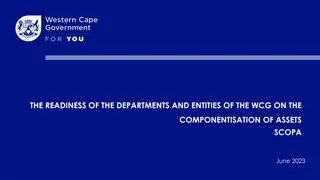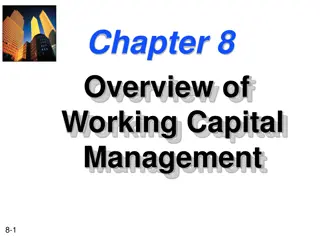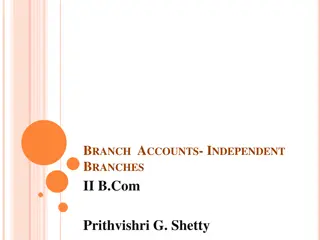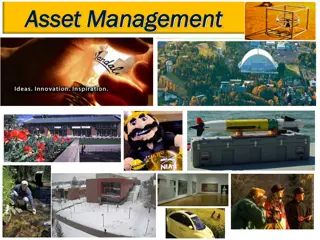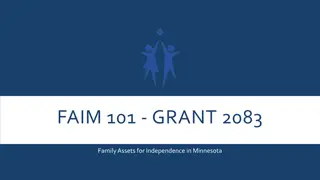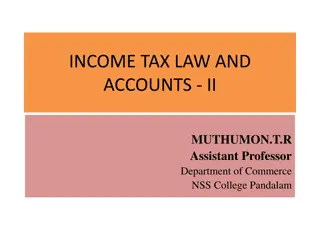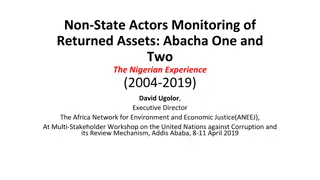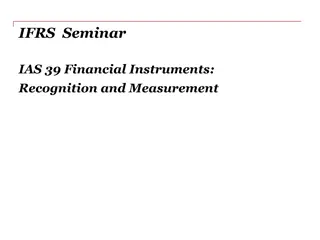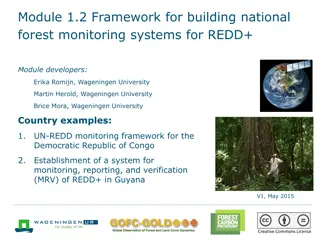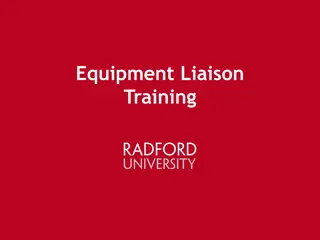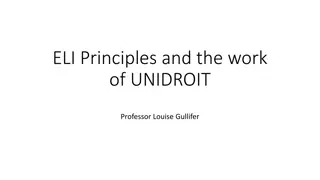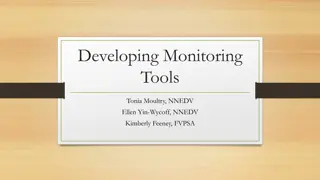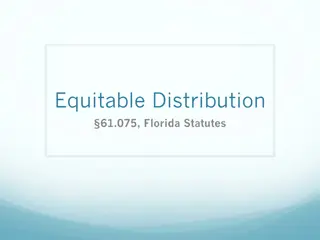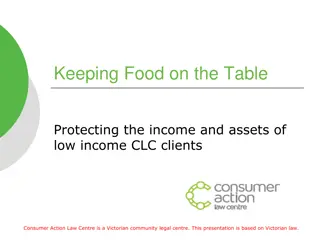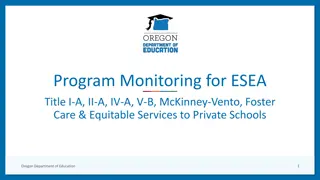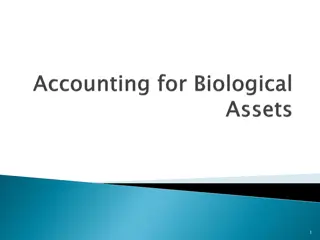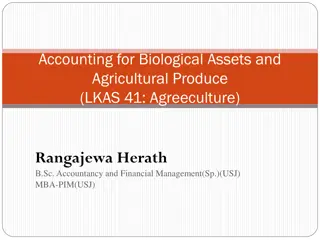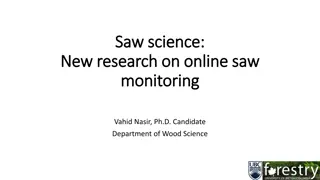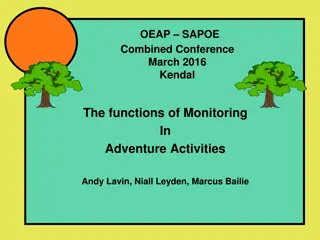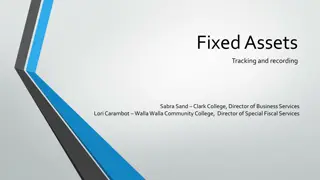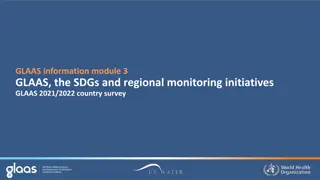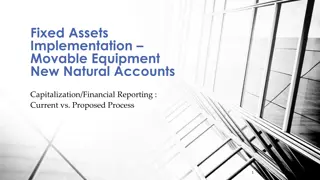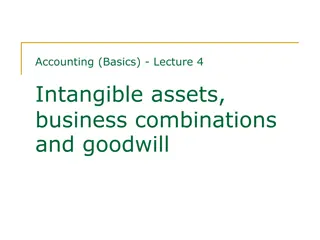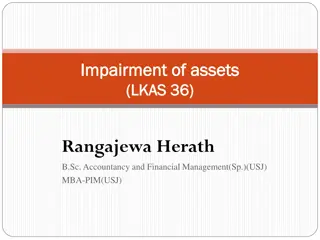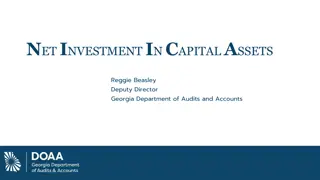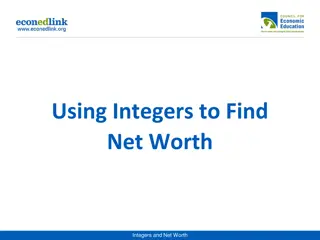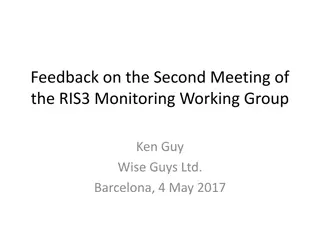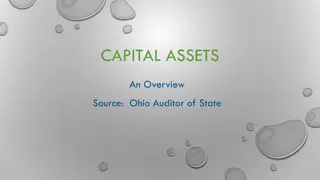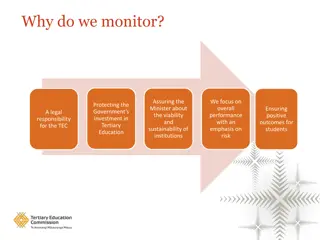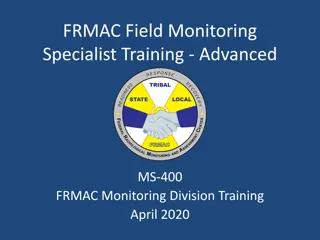Componentisation of Assets: Readiness and Overview for SCOPA June 2023
The readiness of departments and entities within the WCG on the componentisation of assets is discussed along with an overview. Componentisation involves breaking down significant parts of assets into individually identifiable parts with different useful lives. Advantages include accurate tracking o
0 views • 7 slides
NIMH Clinical Research Education and Monitoring Program Overview
NIMH's Clinical Monitoring and Clinical Research Education, Support, and Training Program (CREST) aims to ensure the proper conduct, recording, and reporting of clinical trials. This program includes clinical monitoring plans, guidelines for site monitoring activities, and independent clinical monit
1 views • 29 slides
Understanding International Inheritance Tax Rules
In the realm of international property and succession law, different legal systems like Common Law and Civil Law govern how inheritance tax applies to individuals with assets in multiple countries. For French residents, navigating French succession tax on worldwide assets is crucial, while non-Frenc
2 views • 27 slides
Overview of Working Capital Management in Financial Management
Working capital management involves strategic decision-making regarding a company's current assets and liabilities to optimize liquidity, profitability, and risk. This process includes understanding working capital concepts, financing current assets, managing liability structure, and maintaining the
1 views • 26 slides
Understanding Independent Branches in Accounting
Independent branches in accounting operate autonomously, making purchases externally, receiving goods from the head office, setting their selling prices, and managing expenses from their own cash flow. They keep complete books, prepare financial statements independently, and may engage in inter-bran
1 views • 10 slides
University of Idaho Asset Management Overview
Asset management at the University of Idaho involves the strategic management of equipment assets to safeguard investments, comply with regulations, and facilitate cost recovery. The objectives focus on enhancing asset monitoring, accuracy of inventory records, personnel training, and adherence to p
0 views • 14 slides
Family Assets for Independence in Minnesota (FAIM) Program Overview
The Family Assets for Independence in Minnesota (FAIM) program helps individuals achieve financial independence through a structured process involving eligibility criteria, opening a savings account, financial coaching, obtaining assets, and closing the account. Eligibility requirements include inco
0 views • 25 slides
Metamodel-based Photovoltaic Monitoring System for Renewable Energies at Hongik University
This project at Hongik University focuses on developing a metamodel-based photovoltaic monitoring system to address the challenges of managing diverse solar monitoring systems in Korea. By utilizing a unified data communication protocol, the system aims to streamline the monitoring process for solar
0 views • 18 slides
Capital Gains and Assets Overview in Income Tax Law and Accounts
This content provides an overview of capital gains and assets in income tax law and accounts, covering topics such as types of capital assets, assets not considered capital assets, kinds of capital assets (short-term and long-term), transfer year of chargeability, computation of capital gains, and c
0 views • 15 slides
Monitoring of Returned Assets: Abacha's Legacy in Nigeria
International efforts led by civil society in Nigeria and Switzerland have successfully monitored the return of assets linked to the Abacha regime. Initiatives like the Nigerian Network on Stolen Assets and the Conditional Cash Transfer program demonstrate transparency and accountability in handling
0 views • 10 slides
Understanding IAS 39: Financial Instruments Recognition and Measurement
This content provides an overview of an IFRS seminar on IAS 39, focusing on key concepts such as the classification and measurement of financial assets, impairment, reclassification, and more. It covers definitions of financial instruments, financial assets, equity instruments, and financial liabili
1 views • 43 slides
Understanding Liquidation Estate and Key Asset Components
In the process of liquidation, the liquidator forms an estate comprising various assets of the corporate debtor for the benefit of creditors. These assets include ownership rights, tangible and intangible assets, proceeds of liquidation, and more. However, certain assets owned by third parties or he
0 views • 39 slides
Framework for Building National Forest Monitoring Systems for REDD+
This module outlines a comprehensive framework for developing national forest monitoring systems for REDD+ initiatives. It covers key components such as satellite land monitoring, national forest inventories, greenhouse gas reporting, emission factors, and integrated monitoring systems focusing on c
0 views • 14 slides
University Asset Management Guidelines
University asset management guidelines cover the physical inventory policy, procedures, and fixed asset terminology for safeguarding, tracking, and reporting assets. Departments designate equipment liaisons to manage assets and conduct physical inventories regularly. Assets are categorized as capita
1 views • 21 slides
A Comparison of ELI and UNIDROIT Principles on Digital Assets
A comparison between the principles of Electronic Liability Initiative (ELI) and the International Institute for the Unification of Private Law (UNIDROIT) regarding digital assets. ELI focuses on security over digital assets, while UNIDROIT covers a broader range, including transfers, custody, and m
0 views • 5 slides
Developing Monitoring Tools for Programmatic Oversight
This presentation covers key aspects of monitoring tools for program oversight, including types of monitoring documents, notice of monitoring, and elements to consider. It discusses the importance of informing subawardees about monitoring visits and outlines the components of monitoring forms used i
0 views • 64 slides
Understanding Equitable Distribution in Florida
Equitable distribution in Florida, governed by statutes 61.075 and 61.076, determines the fair division of marital assets and liabilities in divorce cases. Key considerations include identification, valuation, distribution presumption, and justification for unequal distribution. Assets are classifie
0 views • 28 slides
Unpredictable Arctic Monitoring Framework for Extreme Event Integration
This project focuses on integrating extreme event monitoring into existing biodiversity monitoring efforts in the Arctic. The task involves developing a monitoring framework, identifying types of extreme events, and monitoring variables aligned with biodiversity plans. The review paper discusses the
0 views • 15 slides
Managing Debt and Protecting Client Assets in Victoria
Consumer Action Law Centre in Victoria focuses on assisting low-income clients in managing debt and protecting their assets. The presentation emphasizes assessing the need for debt payment, considering the client's financial position, and exploring options to handle debt where income and assets are
1 views • 29 slides
Understanding Society: Wealth and Assets Survey Research
The Wealth and Assets Survey (WAS) conducted by Oliver Tatum and Angie Osborn at the Understanding Society Research Conference in 2013 focuses on longitudinal issues, experiment design, research findings, and future plans related to the survey. The WAS background includes collecting data on personal
3 views • 28 slides
Effective Monitoring Practices for Federal Programs in Education
Effective monitoring practices for federal education programs, such as ESEA Title I-A, II-A, IV-A, V-B, McKinney-Vento, Foster Care, and Equitable Services to Private Schools by the Oregon Department of Education. The monitoring process involves desk monitoring and on-site visits to ensure education
0 views • 23 slides
Accounting for Biological Assets and Agricultural Produce
At the end of this lesson, you will be able to identify the principal issues in accounting for biological assets and agricultural produce at the time of harvest. Topics include the recognition, measurement, presentation, and disclosure of biological assets in financial statements. Questions regardin
0 views • 26 slides
Accounting for Biological Assets and Agricultural Produce (LKAS 41: Agriculture) by Rangajewa Herath
This content provides insights into the accounting standards for biological assets and agricultural produce under LKAS 41, discussing classification, presentation, measurement, gain or loss recognition, and disclosure requirements. It covers the unique nature of biological assets, the scope of LKAS
0 views • 20 slides
Advancements in Online Saw Monitoring for Wood Industry 4.0
Explore the latest research on online saw monitoring in the context of Industry 4.0, focusing on tools like cloud computing, smart sensors, and artificial intelligence for enhanced monitoring capabilities in the sawmill industry. Discover the importance of tool health monitoring, wear detection, and
0 views • 22 slides
Importance of Field Monitoring in Adventure Activities
Field monitoring plays a vital role in ensuring the safety and effectiveness of adventure activities. It involves providing necessary information, instruction, training, and supervision to staff members, thus assuring management of real-time happenings and instilling confidence in both staff and man
0 views • 8 slides
Comprehensive Fixed Assets Management Guidelines for Educational Institutions
Explore a detailed guide on tracking and recording fixed assets in educational institutions, covering key aspects such as capital assets accounting procedures, general ledger accounts, and the definition of capital assets. Learn the minimum standards for valuing assets, recording guidelines, and the
0 views • 25 slides
Comprehensive Overview of GLAAS, SDG Monitoring, and Goal 6 Indicators
The content delves into the Global Analysis and Assessment of Sanitation and Drinking-Water (GLAAS), its relationship with the Sustainable Development Goals (SDGs), particularly Goal 6 on clean water and sanitation. It discusses regional monitoring initiatives, the 2030 Agenda for Sustainable Develo
0 views • 16 slides
Proposed Process Improvements for Fixed Assets Management
Implementing Oracle Fixed Assets for managing fixed assets and capital projects, the proposed process aims to streamline capitalization, improve financial reporting controls, and enhance operational efficiencies. By organizing accounts based on asset categories, tracking ownership, and providing det
0 views • 9 slides
Understanding Intangible Assets and Business Combinations in Accounting
In accounting, recognition of intangible assets as assets requires the expectation of future economic benefits flowing to the entity and reliable measurement of the asset's cost. Intangible assets acquired separately are recognized based on their fair value, while those acquired in business combinat
0 views • 23 slides
Understanding Impairment of Assets in Financial Management
Entities must periodically test for impairment to ensure assets are not overstated. An impairment loss occurs when an asset's carrying amount exceeds its recoverable amount. Assets like inventories and deferred tax assets may require testing. Learn when to undertake impairment tests, key indicators,
0 views • 19 slides
Understanding Net Investment in Capital Assets and Its Importance
Net Investment in Capital Assets is a critical component of an entity's financial position, reflecting the value of capital assets owned. It represents the portion of the net position that is not spendable as it is invested in assets. Calculating Net Investment in Capital Assets involves subtracting
1 views • 17 slides
Understanding Net Worth: Integers and Financial Assets
Learn about net worth, liabilities, and assets by exploring how integers are used to determine the financial standing of individuals. Discover the concepts of liabilities, responsibilities, and assets through real-life examples of notable personalities. Dive into calculations and understand how net
0 views • 18 slides
Insights from RIS3 Monitoring Working Group Meeting at Ken Guy Wise Guys Ltd.
The feedback from the second meeting of the RIS3 Monitoring Working Group at Ken Guy Wise Guys Ltd. in Barcelona highlighted key tasks, including presentations on monitoring exercises, participatory exercises, and the RIS3 Monitoring Clinic. The presentation emphasized humor in communication, while
0 views • 5 slides
Understanding Capital Assets in Financial Reporting
A capital asset is a long-term asset used in operations with a useful life extending beyond a single reporting period, such as land, buildings, and infrastructure. These assets are reported at historical cost, including ancillary charges. Special assets like works of art or historical treasures are
0 views • 35 slides
Effective Monitoring and Investment Relationship in Tertiary Education Institutions
Assurance of viability and sustainability of institutions, focusing on overall performance and risk assessment, safeguarding government investments in tertiary education, ensuring positive student outcomes, and fulfilling legal responsibilities for the Tertiary Education Commission. Monitoring activ
0 views • 6 slides
Understanding Balance Sheets and Income Statements in Financial Reporting
Balance sheets provide a snapshot of a company's assets, liabilities, and shareholders' equity at a specific point in time, with assets listed on the left and liabilities and equity on the right. Current assets are those expected to be converted into cash within a year, while non-current assets are
0 views • 34 slides
Advanced Field Monitoring Specialist Training for FRMAC - MS-400
Providing a refresher for FRMAC Field Monitoring Specialists, this advanced MS-400 training emphasizes sampling and monitoring equipment, data collection methods, and operations. The course includes updates in Monitoring Division operations, lessons learned from past experiences, refresher topics fr
0 views • 12 slides
Digital Assets and Social Media Estate Planning
Explore the world of digital assets and social media estate planning presented by Patricia E. Kefalas Dudek & Howard H. Collens. Understand what digital assets entail, the categories they fall into, and how to assist clients in planning for their digital legacies. Learn about the importance of estat
0 views • 56 slides
Side Channel Monitoring in Additive Manufacturing for Cybersecurity and Quality Assurance
Side channel monitoring is crucial in the field of additive manufacturing to bridge cybersecurity and quality assurance. This process involves detecting physical domain data leakage through various side channels like acoustics, thermal, laser, vibration, electric current, optical, and pressure. By m
0 views • 10 slides
Overview of Title I, Part D Monitoring in Education
This presentation covers the importance of monitoring Title I, Part D programs in education to ensure compliance with State and Federal laws. It includes information on the monitoring review processes, benefits of monitoring, and the different levels at which programs are monitored. The content also
0 views • 27 slides
